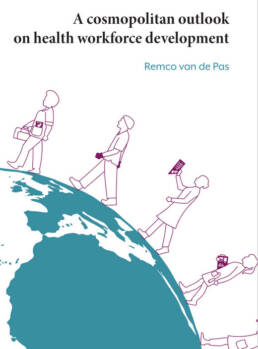As a conclusion of 20 years of study, work and political engagement, the dissertation “A cosmopolitan outlook on health workforce development” of our colleague and Board member Remco van de Pas is a must-read for all who care about global health workforce issue. Thanks for this, Dear Remco, and good luck for the upcoming “defence” session!
Remco van de Pas: A cosmopolitan outlook on health workforce development
“Over the last few decades, the global health workforce (HWF) gap has increased. This gap concerns the skilled HWF required for providing essential health care services across the world in an equitable manner. This thesis takes a cosmopolitan outlook, as coined by Ulrich Beck to describe a reflexive modernity, to study what is required to develop the global health workforce in an equitable manner. It looks into principles and policies of global health governance to assess what has been done to strengthen the health workforce. It also shows that there is a paradox in economic globalization, which leads to a structural problem to invest (sufficiently) in the health workforce at the national level. Via different methodologies, several levels of global health policy and health workforce development are studied. This includes a comparative policy analysis between countries as well as a specific study on health workforce investment in post –Ebola Guinea. Institutional reform of the WHO is studied alongside an analysis on the implementation of WHO’s Code of Practice on the international Recruitment of Health Personnel. The implications of the securitization of health policy on attacks against humanitarian health workers are researched. The thesis includes a critical analysis of the current resilience focus in health systems development. It analyses to what extent global health approaches in the Sustainable Development Goals are grounded in the Right to Health.
The discussion then outlines the democratic space to reform and strengthen health workforce development across the different policy levels of global health governance. This is possible with a more cosmopolitan, transnational outlook to the health workforce challenge and international labour migration. This requires that countries take a shared sovereignty approach and find ways to regulate economic globalization so that it benefits the public good rather than the wealth of a few. However, current policy trends suggest that countries move away from these principles, instead of towards them. The thesis ends with suggestions on how to move beyond this ‘gridlock’ in global health workforce cooperation. It argues for moving beyond economic growth as a policy imperative, and instead take into account the planetary boundaries and social foundations as a basis for future global health workforce governance, known as the Doughnut Economics model.”
The thesis is publicly available here: https://www.globalacademicpress.com/ebooks/remco_van_de_pas/

